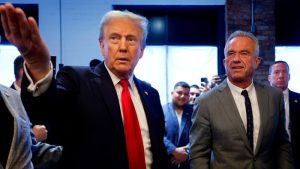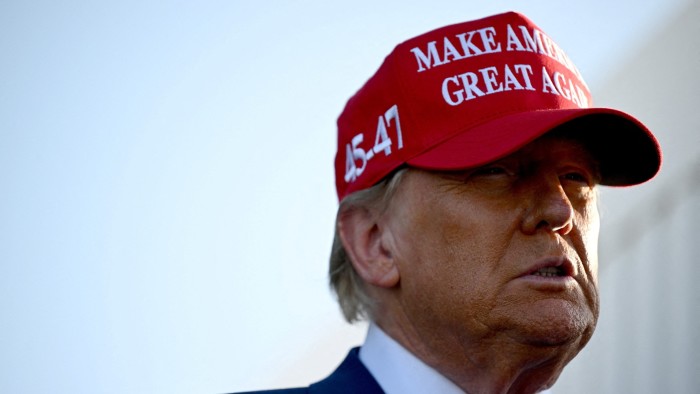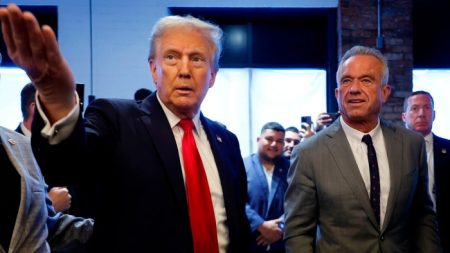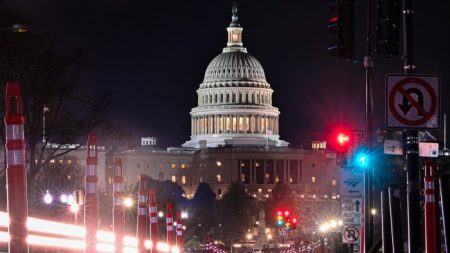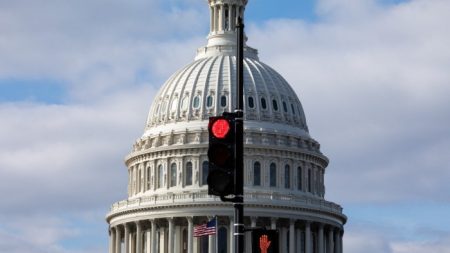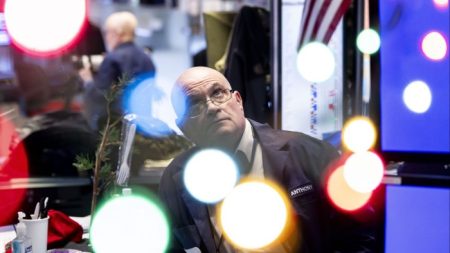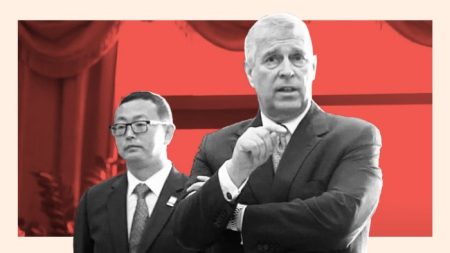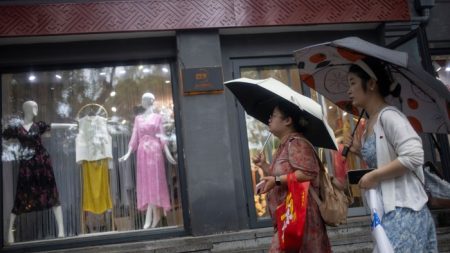Unlock the White House Watch newsletter for free
Your guide to what the 2024 US election means for Washington and the world
Donald Trump has said he will levy tariffs of 25 per cent on all imports from Canada and Mexico, and an extra 10 per cent tariff on Chinese goods, accusing the countries of permitting illegal immigration and drug trafficking.
In a post on his social media site Truth Social, Trump said he would impose the tariffs on Canada and Mexico on his first day in office “on ALL products coming into the United States, and its ridiculous open borders”, which would remain in place “until such time as Drugs, in particular Fentanyl, and all Illegal Aliens stop this Invasion of our Country”.
Trump said the tariffs on China would apply to all imports and would come on top of existing levies, as he criticised Beijing for failing to follow through on promises to impose the death penalty for people dealing fentanyl, a deadly synthetic opioid.
The announcements serve as opening shots in Trump’s confrontational new trade policy, following an election in which he campaigned on broad tariffs and lambasted America’s trading partners. Trump had previously threatened to impose a blanket tariff of more than 60 per cent on all Chinese imports.
“Stiff new tariffs on imports from the US’s three largest trading partners would significantly increase costs and disrupt business across all economies involved,” said Erica York of the Tax Foundation, a Washington-based think-tank. “Even the threat of tariffs can have a chilling effect.”
The US dollar index jumped 0.3 per cent on the news, pressuring other currencies. The Canadian dollar fell 0.9 per cent, while the Mexican peso also shed 0.9 per cent, adding to a sharp depreciation this year. China’s onshore renminbi slipped 0.2 per cent to Rmb7.25, the euro weakened 0.4 per cent and the pound edged down 0.3 per cent.
China hit back at Trump’s comments, which state television CCTV labelled “irresponsible”. Beijing has sought to present itself as a guardian of open global trade, despite accusations of heavily subsidising its manufacturers and maintaining tight barriers on international companies’ access to parts of its domestic market.
“Economic globalisation is an irreversible historical trend,” China’s vice-president Han Zheng said on Tuesday at the opening of a global supply chain expo in Beijing. He added that China would “work to build an open world economic system and safeguard the stability and unimpeded functioning of the global industrial supply chain”.
Trump had in particular targeted Mexico, the US’s largest trade partner, on the campaign trail, threatening to impose “whatever tariffs are required — 100 per cent, 200 per cent, 1,000 per cent” to stop Chinese cars from crossing the southern border.
He has also warned Mexico’s President Claudia Sheinbaum he would levy tariffs of 25 per cent if she did not crack down on the “onslaught of criminals and drugs” crossing the border.
The levies could be imposed using executive powers that would override the USMCA, the free trade agreement that Trump inked with Canada and Mexico during his first term.
“There’s a lot of integration of North American manufacturing in a lot of sectors, particularly autos, so this would be pretty disruptive for a lot of US companies and industries,” said Warren Maruyama, former general counsel at the Office of the US Trade Representative. “Tariffs are inflationary and will drive up prices,” he added.
In a joint statement, Canada’s deputy prime minister Chrystia Freeland and public safety minister Dominic LeBlanc hailed the bilateral relationship with the US as “one of the strongest and closest . . . particularly when it comes to trade and border security”.
They also noted that Canada “buys more from the United States than China, Japan, France, and the UK combined”.
“Even if this is a negotiating strategy, I don’t see what Canada has to offer that Trump is not already getting,” said Carlo Dade, director, trade and trade Infrastructure at the Canada West Foundation, a think-tank.
While Trump put tariffs at the centre of his economic pitch to voters, President Joe Biden has also increased levies on Chinese imports. In May, Biden’s administration sharply increased tariffs on a range of imported clean-energy technologies, including boosting tariffs on electric vehicles from China to 100 per cent.
Biden’s administration has also pushed Beijing for several years to crack down on the production of ingredients for fentanyl, which it estimated claimed the lives of almost 75,000 Americans in 2023. Beijing this year agreed to impose controls on chemicals crucial to manufacturing fentanyl following meetings with senior US officials.
Additional reporting by William Sandlund in Hong Kong, Christine Murray in Mexico City, Ilya Gridneff in Toronto, Joe Leahy in Beijing and Alex Rogers in Washington
Read the full article here


